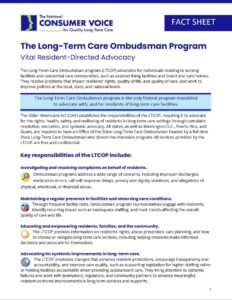The Long-Term Care Ombudsman program (Ombudsman program/LTCOP) advocates for residents of nursing homes, residential care communities (e.g., board and care homes, assisted living facilities), and other similar adult care facilities.
Under the Older Americans Act (OAA), every state is required to have an Ombudsman program that addresses complaints and advocates for improvements in the long-term care system. Each state has an Office of the State Long-Term Care Ombudsman (Office), headed by a full-time State Long-Term Care Ombudsman (Ombudsman) who directs the program statewide. Across the nation, staff and thousands of volunteers are designated by State Ombudsmen as representatives to directly serve residents.






